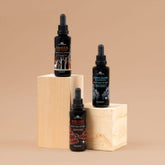
Mushrooms & Mental Health: How Adaptogens Manage Anxiety and Depression
We’ve all been there: the never-ending to-do lists, the endless ping of notifications, and the constant juggling act between work and home. It’s no wonder that nearly half of U.S. adults report feeling stressed out on a regular basis. But what if there was a natural way to help manage this stress and take care of your mental well-being? That’s where adaptogenic mushrooms come in.
How do functional mushrooms change your mood?

Adaptogens are natural herbs or fungi that help the body adapt and respond better to stress. Several mushrooms are considered adaptogens due to certain compounds they contain that lead to stress-reducing effects in the body.
Several studies have shown that functional mushrooms can help improve mood and decrease anxiety. However, it’s important to know exactly how adaptogenic mushrooms boost your overall mental well-being.
Hormone regulation
Research suggests that functional mushrooms can help balance hormones, which are crucial for mood regulation. For instance, Reishi mushrooms contain compounds that interact with the vitamin D receptor, which is necessary for regulating hormonal pathways and maintaining mental health.
Another example is the shiitake mushroom, which influences hormone levels by improving cholesterol metabolism through eritadenine, a compound that lowers blood cholesterol and supports hormone synthesis.
Gut health
Keeping your gut healthy can do wonders for your mood since the gut-brain axis plays a crucial role in mental health. Mushrooms are packed with prebiotic fibers that feed beneficial gut bacteria and contribute to a well-functioning digestive system.
Furthermore, the inflammation-reducing properties of some mushrooms, like Reishi, can reduce gut inflammation and support a balanced microbiome, which can help lower feelings of anxiety and depression.
Neuroprotection
Some mushrooms, like Lions Mane, are excellent for brain health. They contain specialized compounds that promote the production of nerve growth factor (NGF), which is crucial for the growth and maintenance of neurons. This effect can help with cognitive function and ultimately stabilize the mood.
The antioxidant and anti-inflammatory properties of mushrooms also reduce oxidative stress and inflammation in the brain, which are major factors in the development of mood disorders.
Best mushrooms for mood and mental health
Reishi (Ganoderma spp.)

Reishi mushrooms have long been used in traditional medicine for their health benefits, including their ability to improve mood and overall mental health. Research has found that Reishi exhibits antidepressant-like effects, potentially due to its high amount of antioxidants and its ability to boost the immune system.
Lion's Mane (Hericium erinaceus)

Lion’s Mane mushrooms are the kings of neuroprotection. By promoting neurogenesis and improving cognitive functions, Lion’s Mane may alleviate symptoms of depression and anxiety.
Cordyceps spp.

Cordyceps contain bioactive compounds like cordycepin, which have been shown to have neuroprotective and anti-inflammatory effects. Their ability to reduce fatigue could indirectly benefit mood and mental health.
Furthermore, cordyceps extracts have been found to reduce oxidative stress and neuroinflammation, thereby potentially benefiting mental health.
Chaga (Inonotus obliquus)

Chaga mushrooms have some of the highest antioxidants in the world, which can protect the body against oxidative stress. Studies have found that Chaga extracts can have significant neuroprotective effects on the brain since they can reduce neuroinflammation and enhance immune response.
Incorporating functional mushrooms into your everyday routine

For those looking for a more natural remedy to support their mood and maintain a sense of “calm,” adaptogens like mushrooms could be the answer. Including these mushrooms in your daily routine can be a simple and versatile way to improve your mental well-being and overall health.
Consistency is key when supplementing with functional mushrooms, so make sure you find a routine that works best for your busy schedule, whether it’s mixing a tincture into your tea, blending some powder in your morning smoothie, or simply taking a few capsules with your meal.
Before starting any new supplement regimen, including mushroom supplements, it’s important to discuss any concerns with a medical professional to ensure they are safe and suitable for your personal health requirements.


